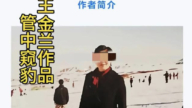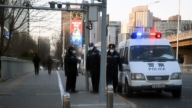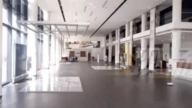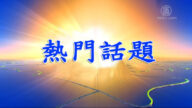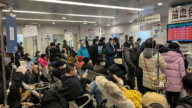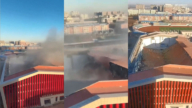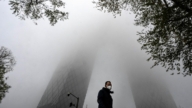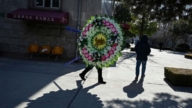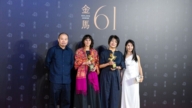【新唐人2011年5月9日訊】最近,被中共指控“非法向境外提供情報”而被判13年重刑的韓戰學者徐澤榮 博士,再次受到輿論關注。海外媒體報導,他有可能在今年(2011年)6月提前出獄。分析人士認為,中共濫用“保密法”,所謂的“國家機密”成為無處不在的“陷阱”。
現年57歲的徐澤榮是香港居民,牛津大學政治學博士。他是研究韓戰問題的專家,2000年7月徐澤榮被當局指控“洩露國家機密”,2001年12月被廣東省深圳市中級法院以“非法向境外提供情報”罪和“非法經營出版”罪,判處13年重刑。
《美國之音》報導,徐澤榮有望在今年(2011年)6月提前出獄。一直以來,徐澤榮一案所暴露的中國人權問題深受世界關注,國際上很多學者、學術組織以及非政府組織,多年來不斷呼籲中共早日釋放這位學者。
出生於高幹家庭的徐澤榮,先後在哈佛大學和牛津大學攻讀政治學,回香港後從事學術研究及出版工作,被捕時任職廣州社會科學院客座教授、廣州中山大學東亞研究所副研究員。
當局指控他在做博士論文時,從朋友家中得到50年前有關韓戰的中共內部資料,複印後轉交給韓國的研究人員。
加拿大《漢和防務評論》刊物總編輯平可夫,對徐澤榮案非常了解。他曾對《美國之音》表示,在西方世界,有些軍情連一般的軍事愛好者都知道,可是在中國,這些全部是機密。當局只要想打擊誰,就使用“洩露國家機密罪”。平可夫說,徐澤榮的案子就更奇怪了,因為他涉及的是50年前的韓戰資料。他強調:“中國社會是一個到處充滿陷阱的社會。”
而根據中國的“保密法”,國家絕密的保密期限為30年、機密為20年、秘密為10年,除有特殊規定外,到期自行解密。而徐澤榮獲得的韓戰材料是50年前的,即使當初是絕密資料,也早已經解密了。但當局為了給徐澤榮定罪,硬是讓廣州軍區做了一個所謂鑑定,號稱徐澤榮拿到的文件屬於國家機密。
香港《開放》雜誌總編輯金鐘對《美國之音》表示,徐澤榮獲罪的真正原因是:他被捕前不久,曾在香港《亞洲週刊》發表文章《馬共秘密電臺湖南曝光》,文中揭露了中共支持馬來西亞共產黨進行赤化宣傳和武裝叛亂的內幕,從而激怒當局。
金鐘(香港《開放》雜誌總編輯):“最重要的恐怕是,他在《亞洲週刊》上寫文章報導,馬來西亞共產黨在湖南省益陽地區某山頭上面搞秘密電臺。(這件事情)以前一直沒有人知道,更沒有人報導。”
金鐘強調指出,中共的思維意識狹隘而保守,充斥著偏見與自卑,濫用所謂保密法就是一個典型例證。
而除了徐澤榮外,身陷中共“保密法”陷阱的記者和專家學者更是數不勝數。僅近年就有上海律師鄭恩寵、香港《文匯報》駐東北記者姜維平、湖南記者師濤、新加坡《海峽時報》駐北京記者程翔、揭露中共腐敗的譚作人等。
前北京《經濟學週報》副主編高瑜,也曾被中共當局以“洩露國家機密罪”判處6年徒刑。她對《美國之音》表示,目前,大陸媒體人人自危,自我審查非常嚴重;大陸的新聞自由不斷惡化,現在的輿論環境甚至還不如上世紀80年代。
新唐人記者李謙、李若琳綜合報導。
CCP’s Secrets Act Trap
Korean war scholar Xu Zerong was jailed
for 13 years by Chinese government for so-called
“providing classified intelligence to other countries.”
Overseas media reported he might be released in June.
Analysts believe CCP abused the Secrets Act
by setting traps for innocent people.
The 57-year-old Hong Kong’ citizen Xu Zerong,
also Oxford University political science doctor
and a specialist on Korean wars, was accused
in July 2000 of disclosure of state secret,
and sentenced in December 2001 to 13 years
by Shenzhen intermediate court for illegal
provision and publishing of intelligence data.
VOA said he was likely to be released early June.
His case was exposed through world’s attention
on human rights issues in China.
International organizations have been calling
for his release.
Born in a senior official’s family,
Xu Zerong studied politics in Harvard and Oxford,
and did academic and publishing work in HK.
He was a visiting professor of social science
in Guangzhou and East Asian Institute fellow
in Zhongshan University when arrested.
He was accused of disclosing CCP’s intelligence
about the Korean War to his friends in Korea.
Ping Kefu, Chief Editor of Kanwa Intelligence Review,
was highly aware of Xu’s case. He told VOA that
some well-known military intelligence in the West
had been kept secret in China.
Disclosure of state secrets was the usual excuse
to persecute people at will by CCP.
Ping Kefu said, Xu’s was a weird case, as it is
all about Korea War 50 years ago.
He thinks that in China, traps are ubiquitous.
According to China’s Secrets Act, 30-year is
the confidential period for “top-secret” information.
A “second-grade secret” is kept for 20 years,
while a “normal secret” 10 years.
Xu’s case involves information of 50 years ago.
This is far beyond any legal deadlines.
CCP imposed accusations on him by using
Guangzhou Military’s false testimony.
Jin Zhong, Chief Editor of Open magazine in HK
told VOA, the real reason for Xu’s persecution
was that he published an article in Asia Weekly
about CCP’s support of Malaysian Communist Party’s
propaganda and military rebels.
Jin Zhong: “He revealed in Asia Weekly
that MCP had secret radio station in Yiyang, Hunan.
It was unknown to the public and never reported.”
Jin Zhong said, the CCP was partial and biased,
to which the Secrets Act misuse was a perfect proof.
Apart from Xu Zerong, unjust Secrets Act cases
have been abundant, like Hunan reporter Shi Tao,
HK Wen Wei reporter in east China Jiang Weiping,
Zheng Enchong from Shanghai, Cheng Xiang
of Singapore’s The Straits Times in Beijing,
and the CCP’s critic Tan Zuoren.
Former deputy chief editor of Economist Weekly,
Gao Yu, was given 6 years in the same accusation.
Gao told VOA, in China today, everyone in the media
is subjected to CCP’s scrutiny.
Press freedom has been incrementally repressed.
It’s worse than the 1980s.
NTD reporter Li Qian and Li Ruolin


